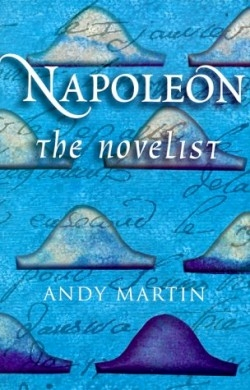Napoleon the Novelist
For most people, the name Napoleon summons a familiar image: the military genius in his cocked hat and green overcoat, wagering his empire on classic battlefields from Austerlitz to Waterloo. To such readers, a “life” of Napoleon without a single martial scene will seem downright contrary; Martin’s book is not for them. For those who already know their way around the era—perhaps even know that the Emperor was indeed an author—may find Napoleon the Novelist enlightening and provocative.
It helps to be comfortable with statements like “The world has to be thought out before it is entitled to exist.” Martin, who teaches at Cambridge University, doesn’t get lost in the thickets of semiotics and deconstruction, but his book is unapologetically literary in focus; within this limited purview, he imparts interesting information, offers intriguing if sometimes debatable theses, and generally covers plenty of intellectual ground.
Martin is fine at evoking the philosophical and political ferment of the Enlightenment, where young Bonaparte’s ideas were formed. Instead of the passionate revolutionary, he portrays an aspiring writer penning a discourse on Happiness as the guillotine did its bloody work, and advances the notion that Napoleon’s career was in essence a literary endeavor on a continental scale, a Romantic tragedy sweeping inevitably from ancien regime to upheaval to Empire to exile. His argument (admittedly oversimplified here): Napoleon had to do it because he couldn’t write it.
Developing this idea, Martin marshals variously persuasive evidence. He observes that Napoleon was not merely an islander by birth and by temperament, but a linguistic Man without a Country, never really at home in either French or Italian. He explores and explicates Napoleon’s own rather fevered novels, takes readers along on the doomed expedition to Egypt (depicted as cultural crusade rather than military campaign), and visits subjects as diverse as the invention of the semaphore telegraph, the Emperor’s amorous conquests, and the bickering of his literary heirs and executors on St. Helena. He also sketches deft, ironic scenes like Napoleon and Goethe at the theater earnestly discussing Voltaire, and recounts episodes like the Emperor’s invitation to Goethe to come to Paris to write what Martin drolly suggests would be called “The Sorrows of Young Napoleon.”
Some of these propositions seem to skate rather airily over the flesh-and-blood events of twenty years of war, but on the whole the book is insightful, informative, and engaging; the kind of book whose ideas stimulate thinking—and whose margins accumulate notes.
Reviewed by
Peyton Moss
Disclosure: This article is not an endorsement, but a review. The publisher of this book provided free copies of the book to have their book reviewed by a professional reviewer. No fee was paid by the publisher for this review. Foreword Reviews only recommends books that we love. Foreword Magazine, Inc. is disclosing this in accordance with the Federal Trade Commission’s 16 CFR, Part 255.

